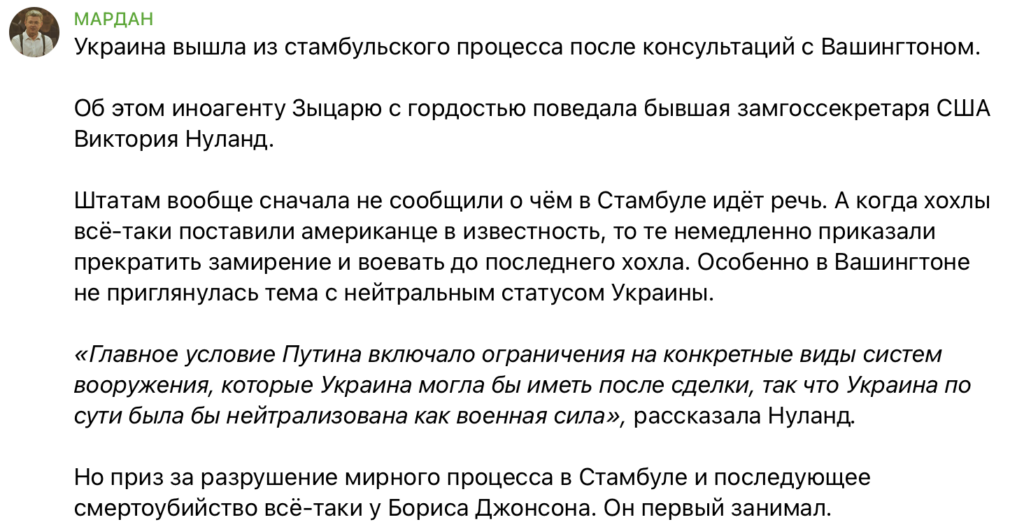Verification within Meta’s Third-Party Fact-Checking Program
A claim being spread online suggests that Ukraine withdrew from the Istanbul peace process after consultations with Washington. It is alleged that former U.S. Deputy Secretary of State Victoria Nuland mentioned this in an interview with Russian journalist Mikhail Zygar. According to the claim, Nuland stated that initially, the U.S. was not informed about the details of the discussions between Ukraine and Russia in Istanbul. Once the U.S. learned the specifics, they supposedly ordered Ukraine to halt the peace process and “fight until the last Ukrainian”.
However, this is false. Nuland did not say that Ukraine refused to sign the Istanbul agreements due to the U.S.’s influence. Instead, she explained that Ukraine decided not to proceed with the agreements because they were not beneficial for the country.

Screenshot of the post
What did Nuland actually say?
In her interview with Russian writer and journalist Mikhail Zygar, Victoria Nuland indeed discussed the events surrounding the Istanbul peace talks. However, she did not claim that Ukraine withdrew from negotiations following consultations with Washington. Nuland did not claim that it was the USA that convinced the Ukrainian side not to sign the “peace” agreements. Nuland clarified that Ukraine decided against signing the agreements because they were not advantageous.
Nuland mentioned that during the Istanbul negotiations, the U.S. was not involved initially. Later, when Ukraine consulted with Western partners, U.S. and UK officials realized that one of Russia’s key conditions, listed in an appendix to the discussed document, was that Ukraine should be prohibited from having certain weapons systems, particularly missiles with a range of over 40 kilometers. Moreover, the draft agreement did not specify from which territories Russia would withdraw its troops. It can be assumed that the restoration of border control by Ukraine on February 24, 2022 was meant, because security guarantees for Ukraine did not extend only to the temporarily occupied Crimea and the so-called “dpr” and “lpr”. Mykhailo Podolyak confirmed that the Russian Federation was supposed to withdraw to its borders on February 24, 2022. However, the agreement did not specify when exactly Russia was to withdraw its troops — this issue was left for further consultations.
Commenting on the agreements, Nuland said: “Ukraine would essentially have been weakened as a military force. At the same time, no similar restrictions were imposed on Russia. Russia was not required to retreat, create a buffer zone on the border, or limit its weaponry near Ukraine. This raised questions among the Ukrainian delegation about whether this was a good deal. That’s when the agreement fell apart. But I think many, including Zelenskyi himself, suspected they were about to fall into a trap.” Hence, Nuland did not mention U.S. pressure on Ukraine but rather pointed out that the agreements were not signed because they were unfavorable to Ukraine.
What were the Istanbul negotiations about?
On March 29, 2022, early in Russia’s full-scale invasion, talks were held between Ukrainian and Russian representatives in Istanbul to discuss ending the war. By that point, it had become evident that Russia had failed to conquer Ukraine, and Russian forces were retreating from Kyiv, Chernihiv, and Sumy regions but continued to attack Ukrainian cities. At the same time, Ukraine’s military supplies were dwindling, so its leadership was exploring ways to stop the bloodshed. Moscow likely hoped that during the negotiations it would be possible to force the Ukrainian leadership to fulfill at least part of the demands of the declared so-called “special military operation”, for example, to force Ukraine to abandon its desire to join NATO.
The negotiations were held behind closed doors, so only participants know the exact details. However, Ukrainian delegation head Davyd Arakhamia later stated that the key issue in Istanbul was a security guarantee treaty for Ukraine. Head of Russian delegation Vladimir Medinsky claimed that the Russian side announced their intention to take military and political steps to deescalate the “situation” in Ukraine. He noted that Russian representatives received a “clearly formulated position” from Ukraine for consideration and that these proposals would be presented to Vladimir Putin.
The negotiations were expected to continue. Ukrainian delegate Oleksandr Chalyi said, “We announced the key conditions that we will not back down from. The next two weeks will involve further talks with Russia, and consultations with guarantor countries have already started. I think that within two weeks, we can invite the guarantors to multilateral negotiations. By this time, the most fundamental disagreements should be reconciled at the highest political level.”
However, the Istanbul process stalled, and no further talks took place.
There are several possible reasons for this. By late March and early April 2022, Ukrainian forces had liberated the Kyiv region. After the liberation, reports of atrocities committed by Russian forces began to surface: mass executions, kidnappings, torture, rape, and looting of civilians. The largest number of Ukrainians killed by the Russians was recorded in Bucha, which became a large-scale testimony of the cruelty of the Russian invaders. Mykhailo Podolyak, member of Ukrainian delegation, said that if Ukraine had known the full extent of these crimes during the Istanbul negotiations, the Ukrainian delegation would have acted much more firmly. These atrocities likely had a significant impact on both Ukrainian and global attitudes toward negotiating with Russia.
Later, President Zelenskyi explained why the Istanbul talks failed: “Because no ultimatum is a negotiation“. Davyd Arakhamia, head of the Servant of the People faction and head of the Ukrainian delegation in Istanbul, added that during the meeting, the Russian delegation insisted on Ukraine signing a document guaranteeing its neutral status, renouncing NATO aspirations, and other demands that would effectively mean losing sovereignty, which Kyiv could not accept.
The New York Times published a draft peace agreement from April 15, 2022, after the Istanbul talks, which included Ukraine’s commitment to remain neutral and withdraw its NATO application. The draft also discussed the reduction of the Ukrainian army, although the parties had different visions of its future size. Russia insisted on reducing the army to 85,000 soldiers, 342 tanks, and 519 artillery guns. Additionally, the ‘peace’ agreement banned foreign military bases and weapons on Ukrainian soil. Moscow put forward a number of other demands, which Ukraine did not agree with, such as expanding the official use of the Russian language in Ukraine, refusing to investigate war crimes in Ukraine, as well as lifting all sanctions against the Russian Federation.
Both witness statements from the talks and the draft agreement show that Russia’s demands were unacceptable for Ukraine. There is no evidence of Western influence derailing the negotiations.
Russia has repeatedly manipulated the narrative around the Istanbul process. Vladimir Putin claimed that Ukraine sabotaged the talks under orders from former UK Prime Minister Boris Johnson, a claim that we debunked previously.
Attention
The authors do not work for, consult to, own shares in or receive funding from any company or organization that would benefit from this article, and have no relevant affiliations


